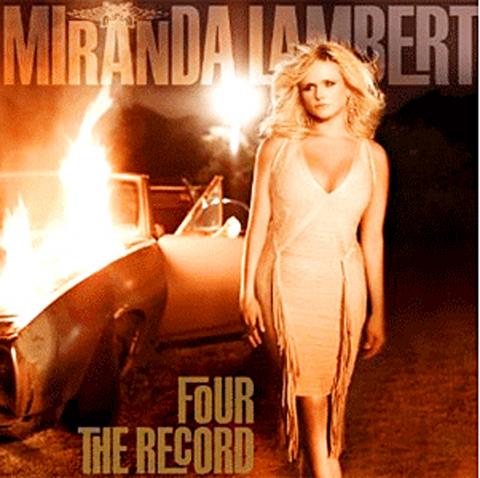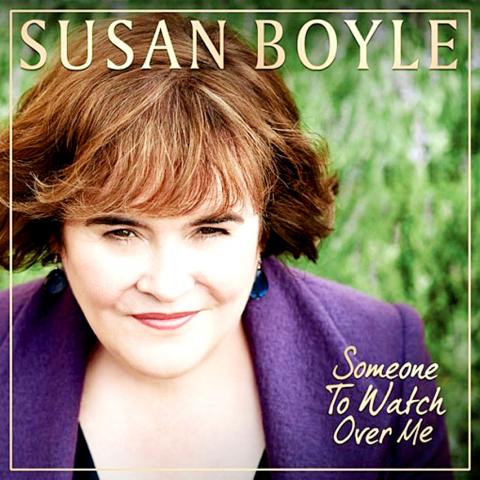Enough with the outsider narratives: Even when Miranda Lambert was a ferocious Nashville upstart obsessed with firearms and comeuppance, she wasn’t so strange. She was a clear inheritor of the legacies of generations of tough female singers: Loretta Lynn, Jessi Colter, firebrand-era Dixie Chicks, even Reba McEntire in her saucy early years.
Furthermore, as the hits on Lambert’s last album Revolution showed, she was more than capable of succeeding in Nashville’s restrictive framework without deviating too far from her own.
Those songs, White Liar and The House That Built Me, finally made Lambert a country superstar — and earned her best female vocalist plaudits at the Country Music Association and Academy of Country Music awards. So on Four the Record, her fourth album, Lambert has plenty of newfound capital to spend.

She does so in audacious and perplexing fashion. This is Lambert’s least direct album, at times a carnival of left-field country styles and approaches. Unlike her side project Pistol Annies, released this year, which was devoted to reviving and energizing classic country modes, the twists on Four the Record feel almost experimental.
Early on the album comes Fine Tune, a song that is literally fuzzy, with Lambert sounding as if she were singing through a piece of steel wool. Later is the jaunty Easy Living, which has a steady stream of radio chatter in the background, troubling Lambert’s easy story of a happy relationship.
Still, that song is the best example on this album of what Lambert can do with her voice alone, even with a straightforward lyric. She sings in a bendy chirp, sometimes shooting rapid-fire syllables, and sometimes mulling over a word with a couple of notes before letting it go. Rarely does she sound offhand.

And normally, she’s emphatic in the right places, but this album also includes some of Lambert’s least committed singing, like on Fastest Girl in Town and Safe. On Dear Diamond, about a wife-to-be keeping a secret from her future husband, the most affecting vocals are the backgrounds, sung with stern compassion by Patty Loveless.
Alarmingly, these are some of the songs Lambert was involved in writing, which typically has been one of her strong suits. But the tracks she contributed here are among the weakest, especially given how unusual some of the material she chose from other writers is, like All Kinds of Kinds, a humorous plea for tolerance that features a cross-dressing congressman and circus freaks.
Lambert also finally uses this album to enter the world of alt-country, a scene she’s long been falsely tagged as representing. The bruising, swinging Mama’s Broken Heart recalls the 1930s and Dwight Yoakam. She covers Gillian Welch’s Look at Miss Ohio but strips out its wry side. And Allison Moorer wrote a song for her, Oklahoma Sky, about Lambert’s rediscovering herself in the home state of her husband — country star Blake Shelton — and Lambert owns it, with her most vulnerable singing on the album.

Lambert and Shelton sing together on Better in the Long Run, the most pop-minded song here, recalling the duets of Tim McGraw and Faith Hill, and Lambert doesn’t sound even a bit out of place. But all that pretending to be small elsewhere on the album? Perhaps they’re hints of a true outsider in the making.
In a program note on her third album, Someone to Watch Over Me, Susan Boyle declares: “Someone is indeed watching over us. Someone we look to for guidance.” Those words are appended to her six-line abbreviation of the album’s title song, the Gershwin standard re-imagined as a prayer for divine assistance from “a little lamb who’s lost in the woods.”
Like Boyle’s first two albums, I Dreamed a Dream and The Gift, this is a solemn, inspirational collection in which Boyle suggests a shy lonely church mouse seeking spiritual refuge. Its staid piano-and-strings arrangements are heavily draped around Boyle’s sweet voice, which treats every number as a stolid hymn without psychological subtext.
Cut by cut, Someone to Watch Over Me is not as strong as its forerunners. Her flashiest vocal trick — an out-of-the-blue octave leap upward — lent an eerie power to her version of the Rolling Stones’ Wild Horses, the outstanding cut on her first album. Here she does the same thing, although much less effectively, on Unchained Melody. There isn’t an ounce of swing in Boyle’s earnest delivery, and percussion is minimal except on numbers whose crashing drums evoke the ceremonial pomp of Vera Lynn’s World War II hits.
Boyle drastically slows down Depeche Mode’s Enjoy the Silence, Tears for Fears’ Mad World and Joni Mitchell’s Both Sides Now. The grandest production belongs to the anthem You Have to Be There, a desperate cry for salvation from a lost soul “drifting on a dark and stormy sea” composed by Benny Andersson and Bjorn Ulvaeus of Abba for the Swedish historical musical Kristina. Another churning ballad, Return, written by her producer, Steve Mac, and Wayne Hector, pleads for a dead loved one to come back from the great beyond.
Lilac Wine, the album’s most glaring mismatch of singer to material, is an alcoholic paean to lubricated self-pity that Boyle’s sober, plodding rendition treats as a song about transubstantiation. But the lyrics of this besotted lament resist her best efforts to dry out a torch song whose narrator seems headed straight for a blackout.
Three years ago, Michael Feinstein, the piano bar crooner turned stand-up entertainer, jumped ship, so to speak, with his album The Sinatra Project, in which he became an acolyte of Ol’ Blue Eyes after two decades in the Bing Crosby and Fred Astaire camps. His big leap was the culmination of years spent developing his skills as a swinging lounge singer unleashed from the piano. Its perfect moment, Begin the Beguine, was an uncanny homage to the sound and style of the classic Sinatra recording of I’ve Got You Under My Skin.
Now comes The Sinatra Project, Vol. II: The Good Life, whose stylistic center of gravity is the 1960s, where the first volume had its heart in the 1950s, Sinatra’s greatest decade. Once again, the conductor and arranger Bill Elliott, who created eerie evocations of the Nelson Riddle and Billy May orchestrations on the first album, is the record’s aural alchemist.
From the opening cut, Dickie Thompson’s obscure, campy Thirteen Women, (the B-side of Bill Haley and the Comets’ global game changer Rock Around the Clock) exhibits a more playful attitude. On songs like Hallelujah, I Love Her So, Is You Is or Is You Ain’t My Baby?, Luck Be a Lady and The Lady Is a Tramp, Feinstein doesn’t bear down as heavily as before. Instead of Riddle or May, you think of spy movie soundtracks, Xavier Cugat and the Rat Pack (Dean Martin in Sway, Sammy Davis Jr in Once in a Lifetime).
Three beautifully sung ballads — I’ll Be Around, The Way You Look Tonight (a smooth, glossily orchestrated bossa nova) and the old Tony Bennett hit The Good Life, arranged for just voice and piano — are the heart of an album that finds Feinstein embracing his past as an intimate crooner and popular music purist par excellence. The breezier pastiches might make an ideal soundtrack for a season of Mad Men if the series were set in Las Vegas.

May 18 to May 24 Pastor Yang Hsu’s (楊煦) congregation was shocked upon seeing the land he chose to build his orphanage. It was surrounded by mountains on three sides, and the only way to access it was to cross a river by foot. The soil was poor due to runoff, and large rocks strewn across the plot prevented much from growing. In addition, there was no running water or electricity. But it was all Yang could afford. He and his Indigenous Atayal wife Lin Feng-ying (林鳳英) had already been caring for 24 orphans in their home, and they were in

On May 2, Chinese Nationalist Party (KMT) Chairman Eric Chu (朱立倫), at a meeting in support of Taipei city councilors at party headquarters, compared President William Lai (賴清德) to Hitler. Chu claimed that unlike any other democracy worldwide in history, no other leader was rooting out opposing parties like Lai and the Democratic Progressive Party (DPP). That his statements are wildly inaccurate was not the point. It was a rallying cry, not a history lesson. This was intentional to provoke the international diplomatic community into a response, which was promptly provided. Both the German and Israeli offices issued statements on Facebook

Even by the standards of Ukraine’s International Legion, which comprises volunteers from over 55 countries, Han has an unusual backstory. Born in Taichung, he grew up in Costa Rica — then one of Taiwan’s diplomatic allies — where a relative worked for the embassy. After attending an American international high school in San Jose, Costa Rica’s capital, Han — who prefers to use only his given name for OPSEC (operations security) reasons — moved to the US in his teens. He attended Penn State University before returning to Taiwan to work in the semiconductor industry in Kaohsiung, where he

Australia’s ABC last week published a piece on the recall campaign. The article emphasized the divisions in Taiwanese society and blamed the recall for worsening them. It quotes a supporter of the Taiwan People’s Party (TPP) as saying “I’m 43 years old, born and raised here, and I’ve never seen the country this divided in my entire life.” Apparently, as an adult, she slept through the post-election violence in 2000 and 2004 by the Chinese Nationalist Party (KMT), the veiled coup threats by the military when Chen Shui-bian (陳水扁) became president, the 2006 Red Shirt protests against him ginned up by